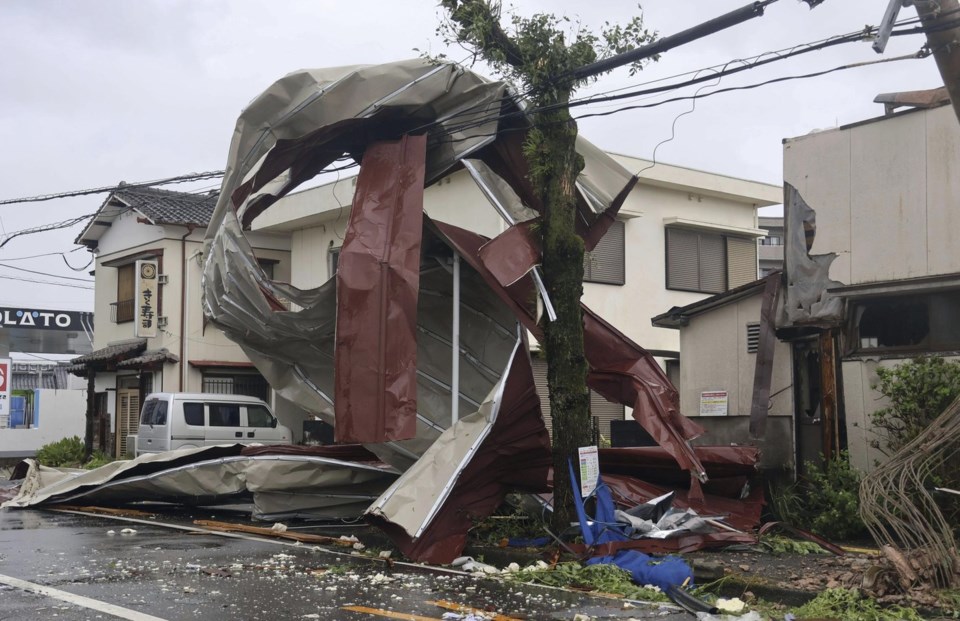TOKYO (AP) — A strong storm lashed with torrential rain and strong winds Thursday, causing at least three deaths as it started a crawl up the length of the archipelago and raised concerns of flooding, landslides and extensive damage.
made landfall Thursday morning as a powerful typhoon on the southern island of Kyushu and then gradually lost strength, though it was still forecast to bring strong winds, high waves and significant rainfall to most of the country, particularly on Kyushu.
About 60 centimeters (nearly 2 feet) of rain fell in parts of Miyazaki prefecture on Kyushu, swelling rivers and threatening floods, the Japan Meteorological Agency said. That 24-hour total was more than the average rainfall for all of August, it said.
By late afternoon Thursday, the storm was moving north at 15 kph (9 mph) and its winds had weakened to 108 kph (67 mph). It is “no longer a powerful typhoon,” the agency said.
As disaster risks in the Kyushu region subsided later Thursday, Shanshan started dumping heavy rain on neighboring Shikoku island.
The storm ripped through downtown Miyazaki city on Kyushu, knocking down trees, throwing cars to the side in parking lots and shattering windows of some buildings. The prefectural disaster management task force said about 50 buildings were damaged.
NHK public television showed a swollen river in the popular hot spring town of Yufu in Oita prefecture, just north of Miyazaki, with muddy water splashing against a bridge.
More than 70 people were injured across Kyushu, mostly in Miyazaki and Kagoshima. Some were injured by being thrown to the ground by the storm on their way to shelters, the Fire and Disaster Management Agency said.
About 168,000 households were without power across Kyushu, most of them in Kagoshima prefecture, Kyushu Electric Power Co. said.
About 20,000 people took shelter at municipal community centers, school gymnasiums and other facilities across Kyushu, according to prefectural reports.
Ahead of the storm's arrival, heavy rain triggered a landslide that buried a house in the central city of Gamagori, killing three residents and injuring two others, the city’s disaster management department said. On the southern island of Amami, which Shanshan passed, one person was injured by being knocked down by a wind gust while riding a motorcycle, the fire agency said.
Weather and government officials are concerned about extensive damage as the storm slowly sweeps up the Japanese archipelago to the northeast over the next few days, threatening more floods and landslides.
In the Tokyo region, Shinkansen bullet trains connecting Tokyo and Osaka were suspended starting Thursday evening due to heavy rain in the central region. Bullet train service also was to be suspended in parts of the western and central regions on Friday.
Disaster Management Minister Yoshifumi Matsumura said Shanshan could cause “unprecedented” levels of . At a task force meeting on Wednesday, he urged people, especially older adults, not to hesitate and take shelter whenever there is any safety concern.
Hundreds of domestic flights connecting southwestern cities and islands were canceled Thursday, and bullet trains and some local train services were suspended. As the storm headed northeast, similar steps were taken in parts of the main island of Honshu that were experiencing heavy rain. Postal and delivery services were suspended in the Kyushu region, and supermarkets and other stores planned to close.
Mari Yamaguchi, The Associated Press



